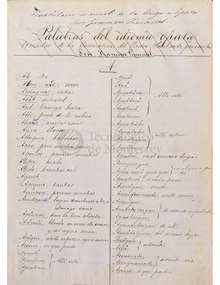lingvo.wikisort.org - Language
Ópata (also Tegüima, Teguima, Tehuima, Tehui, Eudeve, Eudeva, Heve, Dohema, Jova, Joval, Tonichi, Sonori and Ure; Opata: Teguima) is either of two closely related Uto-Aztecan languages, Teguima and Eudeve, spoken by the Opata people of northern central Sonora in Mexico and Southeast of Arizona in the United States. It was believed to be dead already in 1930, and Carl Sofus Lumholtz reported the Opata to have become "Mexicanized" and lost their language and customs already when traveling through Sonora in the 1890s.
| Ópata | |
|---|---|
| Region | Sonora, Mexico & Arizona, U.S. |
| Ethnicity | Opata |
Language family | Uto-Aztecan
|
| Language codes | |
| ISO 639-3 | opt |
| Glottolog | opat1247 |
| ELP | Opata-Eudeve |
In a 1993 survey by the Instituto Nacional Indigenista, 15 people in the Mexican Federal District self-identified as speakers of Ópata.[1] This may not mean, however, that the language was actually living, since linguistic nomenclature in Mexico is notoriously fuzzy. Sometimes Eudeve is called Opata, a term which should be restricted to Teguima. Eudeve (which is split into the Heve (Egue) and Dohema dialects) and Teguima (also called Ópata, Ore) are distinct languages, but sometimes have been considered merely dialects of one single language. The INALI (Mexican National Institute for Indigenous Languages) does not count Opata among the currently extant indigenous languages of Mexico.[2]
Although the Opata Nation does consider their language inactive and they are in the process of its revitalization. The Fundación OPATA-TEGUIMA launched the first-ever Opata Living Dictionary in 2021 in collaboration with Living Tongues Institute for Endangered Languages.
Classification
Opata had long been considered to be part of the Taracahitic languages, but this is no longer considered a valid genetic unit.[3][4][5][6]
Morphology
Opata is an agglutinative language, where words use suffix complexes for a variety of purposes with several morphemes strung together.

References
- "Opata | Ethnologue".
- INALI
- Shaul, D. L. (2014). A Prehistory of Western North America: The Impact of Uto-Aztecan Languages. UNM Press.
- Hill, J. H. (2011). Subgrouping in Uto-Aztecan. Language Dynamics and Change, 1(2), 241-278.
- De Wolf, P. (2001). Eudeve and Opata: a reassessment of their classification. Avances y balances de lenguas yutoaztecas, ed. by JL Moctezuma-Zamarrón and JH Hill, 237-65.
- Shaul, D. L. (1983). The position of Opata and Eudeve in Uto-Aztecan. Kansas Working Papers in Linguistics. Vol. 8, No. 2
- Lombardo, Natal. 1702. "Arte de la Lengua Teguima vulgarmente llamada Opata". México: Miguel de Ribera.
- Lombardo, Natal. n.d., ca. 1702. Arte de la Lengua Teguima vulgarmente llamada Opata. Ayer ms. 1641. Newberry Library, Chicago.
- Loaysa, Balthasar, unknown year, Arte de la lengua hegue. Ms. in Bibliothèque Nationale, París; copia de W.E. Gates en la Ayer Collection, Newberry Library, Chicago.
- Lionnet, Andrés. 1979. El lexico del eudeve. Mimeography. Friends of Uto-Aztecan Working Conference, Instituto de Investigaciones Antropologicas, Universidad Nacional Autonoma de Mexico, Mexico, June 23. : .
- Miller, Wick R., 1983, "A Note on Extinct Languages of Northwest Mexico of Supposed Uto-Aztecan Affiliation", International Journal of American Linguistics, Vol. 49, No. 3, Papers Presented at a Symposium on Uto-Aztecan Historical Linguistics (Jul., 1983), pp. 328–334
- Shaul, David Leedom, 1989 "Teguima (Opata) phonology", Southwestern Journal of Linguistics 9:150-162. ...
- Shaul, David Leedom, 1990, "Teguima (Opata) Inflectional Morphology", International Journal of American Linguistics, Vol. 56, No. 4 (Oct., 1990), pp. 561–573
- Smith, Buckingham
- Grammatical Sketch of the Heve Language at Project Gutenberg
На других языках
- [en] Opata language
[es] Idioma ópata
La lengua ópata es una lengua uto-azteca casi extinta o lengua muerta hablada en México, hasta 1993 se consideró que había dejado de ser una lengua vehicular hacia 1930. Carl Lumholtz documentó en 1890 en un viaje por Sonora que los ópatas se habían «mexicanizado» y estaban perdiendo su lengua y sus costumbres. De 1950 en adelante no se habían registrado hablantes con buena fluidez y únicamente se conservan frases y palabras aisladas entre los que sí hablan la lengua. Sin embargo, en 1993 investigadores del Instituto Nacional Indigenista (INI) encontraron quince hablantes de la lengua que vivían en Ciudad de México.[1] No se ha documentado con precisión el grado de conocimiento de estos hablantes.[fr] Opata
L’opata (ou teguima) est une langue uto-aztèque du Sud parlée au Mexique, dans le Nord de l'État de Sonora. La langue, qui fait partie de la branche taracahitique, est connue par des manuscrits de l'époque coloniale. Elle est éteinte.[ru] Опата (язык)
Опата (Opata, Ópata, Teguima, Eudeve, Heve, Dohema) — мёртвый язык, который был распространён в муниципалитетах Аривечи, Бакаора, Накори, Онавас, Сауарипа, Суаки штата Сонора в Мексике. Считается, что язык был мёртвым уже в 1930 году, а Карл Софус-Лумхольц сообщил, что опата «мексиканизированы» и потеряли свой язык и обычаи уже при передвижении через штат Сонора в 1890-х годах, но в недавнем исследовании организации INALI названы 15 человек в Мексиканском федеральном округе как носители опата — однако это ещё не значит, что фактически язык живёт, так как языковая номенклатура в Мексике является нечёткой. При этом не было опубликовано никаких исследований в отношении разговорного языка этих 15 человек. Если эти люди действительно являются носителями одного из языков опата, то эти языки надо рассматривать как находящиеся на грани исчезновения, а если нет, то как с большой вероятностью уже исчезнувшие.Другой контент может иметь иную лицензию. Перед использованием материалов сайта WikiSort.org внимательно изучите правила лицензирования конкретных элементов наполнения сайта.
WikiSort.org - проект по пересортировке и дополнению контента Википедии